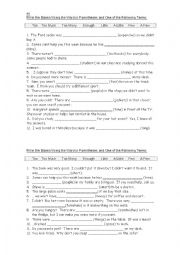
|
Too Enough Little Few -- Fill in the Blanks
These are two sets of 12 sentences to complete using: Too/too many/too much/enough/few/a few/little/a little. Students should have had a little practice with each term before trying this one with everything mixed together. Answers included on second page.
Level: intermediate
Age: 13-17
Type: worksheet
Downloads: 10
|
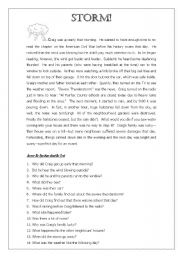
|
Storm Text
This is an original text I wrote to practice the past simple and past continuous with vocabulary related to the weather. Students can read out loud to practice pronunciation before answering the 14 comprehension questions.
Level: intermediate
Age: 13-17
Type: reading
Downloads: 58
|
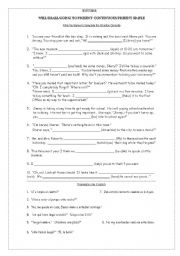
|
Fill in the Blank with the Future
I made this as an exam to test the students� use of some of the future tenses: shall, will, to be going to, present simple and present continuous. There are ten situations and ss must decide from the context which form of the future is best for each case. At the end, there is a small translation section for teachers of Spanish students which can ...
Level: intermediate
Age: 14-17
Type: worksheet
Downloads: 11
|
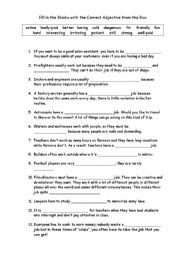
|
Professions: Fill in the Blanks with the Correct Adjectives
This is to help students learn some adjectives and get more familiar with some common professions.
Level: intermediate
Age: 12-17
Type: worksheet
Downloads: 12
|
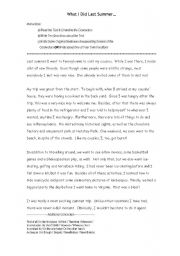
|
Connector Text
This is a description of a summer holiday written in the first person. It is to serve as an example of an essay with special emphasis on the use of conjunctions to make the writing more interesting. There are a great many conjunctions to be identified, explained and consequently used by the students. The second page is a question follow-up to be ...
Level: intermediate
Age: 14-17
Type: Choose
Downloads: 21
|
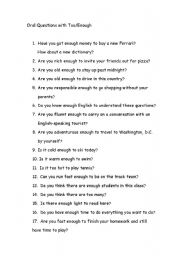
|
Too & Enough, Oral Questions2
More oral questions to practice too and enough: 37 here, with some elaboration. Extra questions can be improvised along the way to enhance classroom conversation.
Level: intermediate
Age: 12-17
Type: others
Downloads: 7
|
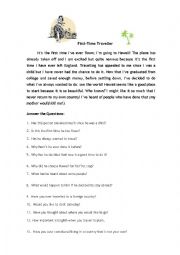
|
First-Time Traveller Text
This is a short text which emphasizes the Present Perfect. It is designed for students who have already started studying this tense. After the text (which may be used first as a listening exercise), there are thirteen comprehension questions.
Level: intermediate
Age: 13-17
Type: reading
Downloads: 41
|
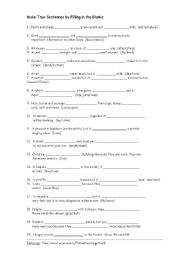
|
Animal Facts: Fill in the Blank with the Correct Form of the Present Simple, Affirmative or Negative
Students fill in the blanks to make the animal descriptions true. Some verbs are negative and some are affirmative. All are in present simple. Follow-up exercise: students invent their own fill-in-the-blank sentences for their classmates.
Level: intermediate
Age: 10-14
Type: worksheet
Downloads: 9
|
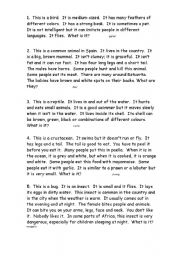
|
Oral Animal Riddles/Listening
These are descriptions of five animals to be read aloud by the teacher. Students must listen and guess what animal is being described in each case. Answers may be written and turned in to the teacher for a grade or students may guess orally. (Answers are provided.)
Level: intermediate
Age: 10-14
Type: Choose
Downloads: 5
|
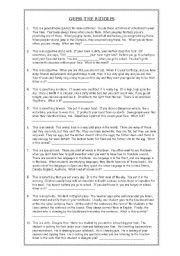
|
Reading Comprehension Riddles
These are ten riddles to test students� reading comprehension. Vocabulary is varied. I made it for my group of 6th graders. Answer Key provided.
Note: I allow students to write the answers in their native language if they don�t know them in English--after all, I am grading reading comprehension, so if they understand the description, that�s g...
Level: elementary
Age: 11-14
Type: reading
Downloads: 25
|